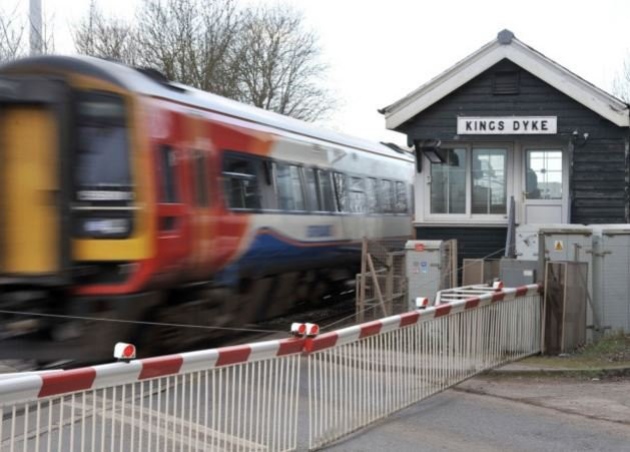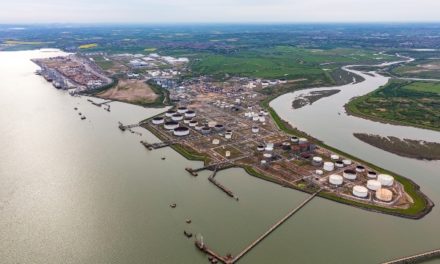A multi-million pound contract for the King’s Dyke improvement scheme at Whittlesey was awarded in April and work could begin by Christmas.
Cambridgeshire County Council announced they have found a contractor for the scheme that involves diverting a 1km length of the A605 and building a new road bridge over the railway. The cost is £2 million more than projected but less than Kier, who designed the scheme, wanted to build it. Had Kier’s quote been accepted the cost could have been £10 million higher than is now in the budget.
The amount of the contract will be announced once councillors agree – the revised budgeted cost of £32 million includes several millions already spent. Council leader Cllr Steve Count said: “This is a huge milestone achievement for the project, and I’m pleased the bold decision to re-tender the design and build contract was taken.
“If we had awarded the contract in August last year, a £41.6 million budget would have been needed. Now it’s been re-tendered, subject to committee approval, almost £10 million will be saved”. Two council committees will consider and vote on the preferred contractor for a project that has doubled in cost since it was proposed.
In addition to agreeing to the extra borrowing needed, the county council is confident of squeezing some extra cash from the Cambridgeshire and Peterborough Combined Authority.
Three contractors were shortlisted after a four-month tender period, but one was later dropped because they wanted design changes. The county council is anxious that the original design is kept to avoid planning delays. The preferred contractor “provided the most economically advantageous tender and also scored highest in both financial and quality assessments” says a report to councillors.
Once the contract is awarded there follows a 10-day ‘cooling-off’ period to allow unsuccessful bidders to challenge the decision. At that stage, we will know which company has won the contract.
The current approved scheme budget of £29.98 million is made up of £5.58 million from the county. £8 million Growth Deal funding approved by the former Local Enterprise Partnership (LEP) and £16.4 million from the Cambridgeshire and Peterborough Combined Authority.
Even though the council is expecting an extra £1.2 million from Mayor James Palmer to help bridge the differences, the county will approve a £32 million spend to enable contracts to be signed.
“The business case for allocating further funding to this project remains very strong,” says the report to councillors.
The plan is for contacts to signed next month and works to start in December with completion within two years.
But there are risks to this timetable, says the report, including completion of utility diversions and successful talks with Network Rail. Weather and unforeseen ground conditions are all “red rated risks” says the council.
“The outbreak of the coronavirus pandemic has the potential to have a significant impact on this project,” says the report.
However, given the rapidly changing position with the virus and government responses, it is difficult to accurately quantify the risks. “This is made even more challenging by it not being possible to discuss the impact with the preferred bidder until the notification of award has been issued following committee approval.”
The report adds: “The risk of impact on the design and construction contract is a council-owned risk and has the potential to lead to significant cost and programme increases.
“These could be caused by a range of issues, from materials not being available from suppliers to loss of capacity or productivity due to the availability of resources or required changes to working practices.
“When discussions can take place with the chosen contractor, these risks can be more fully considered and potential options available to mitigate them identified. “However, even at that stage, the nature of the risk will be uncertain and will depend on the course of the pandemic and actions to contain it throughout the year and outside of the Council and contractor’s control.”
To mitigate the specific Covid-19 risk, the council will create a contingency budget of £1.5 million.
Cllr Chris Boden, local member and leader of Fenland District Council, said: “I cannot stress how much this scheme is needed and how the project will benefit the local community by reducing journey times and unlocking new development opportunities including job growth.”
Cllr Count added: “Obviously, we will now need to work with the new contractor and consider the impact COVID-19 might now have but we are still aiming to start on-site by the end of the year, as promised.”
Cambridgeshire County Council announced they have found a contractor for the scheme that involves diverting a 1km length of the A605 and building a new road bridge over the railway. The cost is £2 million more than projected but less than Kier, who designed the scheme, wanted to build it. Had Kier’s quote been accepted the cost could have been £10 million higher than is now in the budget.
The amount of the contract will be announced once councillors agree – the revised budgeted cost of £32 million includes several millions already spent.
Council leader Cllr Steve Count said: “This is a huge milestone achievement for the project, and I’m pleased the bold decision to re-tender the design and build contract was taken.
“If we had awarded the contract in August last year, a £41.6 million budget would have been needed. Now it’s been re-tendered, subject to committee approval, almost £10 million will be saved”.
Two council committees will consider and vote on the preferred contractor for a project that has doubled in cost since it was proposed.
In addition to agreeing to the extra borrowing needed, the county council is confident of squeezing some extra cash from the Cambridgeshire and Peterborough Combined Authority.
Three contractors were shortlisted after a four-month tender period, but one was later dropped because they wanted design changes. The county council is anxious that the original design is kept to avoid planning delays.
The preferred contractor “provided the most economically advantageous tender and also scored highest in both financial and quality assessments” says a report to councillors.
Once the contract is awarded there follows a 10-day ‘cooling off’ period to allow unsuccessful bidders to challenge the decision.
At that stage, we will know which company has won the contract.
The current approved scheme budget of £29.98 million is made up of £5.58 million from the county. £8 million Growth Deal funding approved by the former Local Enterprise Partnership (LEP) and £16.4 million from the Cambridgeshire and Peterborough Combined Authority.
Even though the council is expecting an extra £1.2 million from Mayor James Palmer to help bridge the differences, the county will approve a £32 million spend to enable contracts to be signed.
“The business case for allocating further funding to this project remains very strong,” says the report to councillors.
The plan is for contacts to signed next month and work to start in December with completion within two years.
But there are risks to this timetable, says the report, including completion of utility diversions and successful talks with Network Rail. Weather and unforeseen ground conditions are all “red rated risks” says the council.
“The outbreak of the coronavirus pandemic has the potential to have a significant impact on this project,” says the report.
However, given the rapidly changing position with the virus and government responses, it is difficult to accurately quantify the risks.
“This is made even more challenging by it not being possible to discuss the impact with the preferred bidder until the notification of award has been issued following committee approval.”
The report adds: “The risk of impact on the design and construction contract is a council owned risk and has the potential to lead to significant cost and programme increases.
“These could be caused by a range of issues, from materials not being available from suppliers to loss of capacity or productivity due to the availability of resources or required changes to working practices.
“When discussions can take place with the chosen contractor, these risks can be more fully considered and potential options available to mitigate them identified. “However, even at that stage, the nature of the risk will be uncertain and will depend on the course of the pandemic and actions to contain it throughout the year and outside of the Council and contractor’s control.”
To mitigate the specific Covid-19 risk, the council will create a contingency budget of £1.5 million.
Cllr Chris Boden, the local member and leader of Fenland District Council, said: “I cannot stress how much this scheme is needed and how the project will benefit the local community by reducing journey times and unlocking new development opportunities including job growth.”
Cllr Count added: “Obviously, we will now need to work with the new contractor and consider the impact COVID-19 might now have but we are still aiming to start on-site by the end of the year, as promised.”
© Eastern Echo (powered by ukpropertyforums.com)














